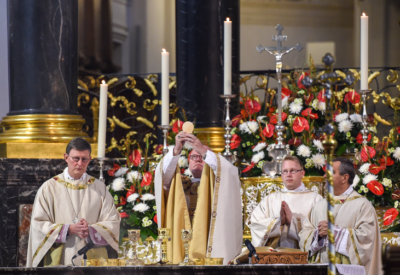 In our previous article we talked about the Real Presence of Jesus in the Eucharist as the true and ancient teaching of the Church. What was affirmed at the Council of Trent, was just that – an affirmation of what was held from the beginning of the Church. The teaching and belief of the Real Presence has been consistent, but language has not. Even in the same language words and their meaning change over time. As time moves ahead, patterns of thinking change. The Ancient Near East (ANE) thought differently from the Greeks who conceptualized differently than the Romans and all that collapsed into the Dark Ages which arose in the Middle Ages, the Renaissance, the Scientific Age, the Industrial Revolution, Modern, Post-Modern, and wait long enough and there will be the next movement of thought. In the midst of all this, think about how each age and thought system considers the word “real.” And I largely stayed in Western thought. The problem is only compounded in Eastern thought and philosophy.
In our previous article we talked about the Real Presence of Jesus in the Eucharist as the true and ancient teaching of the Church. What was affirmed at the Council of Trent, was just that – an affirmation of what was held from the beginning of the Church. The teaching and belief of the Real Presence has been consistent, but language has not. Even in the same language words and their meaning change over time. As time moves ahead, patterns of thinking change. The Ancient Near East (ANE) thought differently from the Greeks who conceptualized differently than the Romans and all that collapsed into the Dark Ages which arose in the Middle Ages, the Renaissance, the Scientific Age, the Industrial Revolution, Modern, Post-Modern, and wait long enough and there will be the next movement of thought. In the midst of all this, think about how each age and thought system considers the word “real.” And I largely stayed in Western thought. The problem is only compounded in Eastern thought and philosophy.
But let me give an example of the complexity of “real” in the story of three baseball umpires. The three are gathered in the off season sharing a beer and talking about the art and craft of umpiring. The first umpire says, “It’s not that complicated. I call ‘em like I see ‘em.” The other two chuckled. One said “Good for you” and took a sip on his beer. The first one, somewhat offended, said that if they were such experts, what did they have to say about the subject? The second umpire says, “It’s a little more complicated than that. I call ‘em like they are.” The first umpire rolls his eyes and the third umpire quips, “I am sure you do”, chuckles, and sips his beer. At this point, the first two turn to the third umpire. The second one says, “OK mister high and mighty, how do you call the game?” The third umpire says, “They ain’t nothing until I call ‘em.”
Three different ways to consider the concept of “real.” For those of you who took courses on Western Philosophy, you probably recognized the story as a very concise history of the movement in western thought. And it is not an abstract dynamic. Consider a young adult in dialogue with a senior citizen. As part of the dialogue, the young adult uses the expression “my truth.” Meanwhile, the senior citizen thinks, “What? My truth? Isn’t there only the truth?” Real, truth, data, fact, evidence – lots of words with meanings that are not always shared. So, at this point in your reading, take a pause and see if you can provide a definition of the word “real” that would be universally accepted. Good luck.
Is the Eucharist real? That depends on who is asking. If the question comes from someone whose thinking is scientific and modern, then they are asking if it is observable, measurable, can be quantitatively described and categorized in a consistent and repeatable way such that a theory can be formed and experimentally proven. Maybe your answer, as a faithful Catholic, comes back, “well… yes, but not like that, and that’s what I believe.” The response is likely, “Look, I am happy you have something you believe in, but real is real. What you believe, that’s just spiritual.” In other words, “spiritual” isn’t real. It’s a symbol at best.
You can see where language and thought construct plays a huge role in how we Catholics express our ancient and true teaching. According to the Pew Survey (referenced a few articles ago), it also plays a huge role in how well we catechize the faithful and hand on this ancient and true teaching.
Is the Real Presence in the Eucharist “real” or only “spiritual”? Next week we will continue this train of thought, but here is some homework for you. Is love real? Is your love for you spouse, your kids, your parents, your grandparents, your significant other – is it real. How do you differentiate it from “spiritual”? Can you measure it consistently and repeatedly? Is it more than feelings, hormones, biological imperative, or other “real” explanations? Is love real? …see you next week.